Nydia Simone and Blactina
Building Our Own Table Episode #4
Yura Sapi: Imanalla mashikuna. Hello friends. How are you? Hola Amiges. ¿Como están?
Welcome back to the Building Our Own Tables podcast, interviewing Black, Native, Asian, and other founders of color of theatre and arts collectives, organizations, initiatives, and movements. Talking about finding anti-oppressive structures and ways of working together that aren't replicating the same white supremacy culture we wanted to get away from. Produced for HowlRound Theatre Commons, a free and open platform for theatremakers worldwide and Advancing Arts Forward, a movement to advance equity, inclusion, and justice through the arts by creating liberated spaces that uplift, heal, and encourage us to change the world. I'm your host Yura Sapi. In today's episode, I got to interview Nydia Simone, founder, creator, and also known as Blactina. Blactina engages audiences through a Black Latinx point of view across multiple platforms. Blactina's mission is to amplify Afro-Latinx and Caribbean stories with an emphasis on women through media and entertainment.
Blactina produces content for film, digital, and television, as well as hosting events, including Black healing retreats in the Dominican Republic. Started in September of 2017, Blactina has been featured in the New York Times, Oprah's online mag, Vice Media, BronxNet TV, and most recently Telemundo and Quibi.
Blactina hits close to me because Nydia is also living and creating a foundation in Latin America, specifically, she's in the Dominican Republic and I'm in Colombia. She’s, of course, also a founder and she's specifically anti-racist—centering Blackness in the Latinx community, the Latinx identity, ethnicity.
PSA, public service announcement: Latinx is not a race. There are Black Latinx people, White Latinx people, Indigenous Latinx people. Mestiza—mixed race, indigenous and white people. Afro-indigenous people. Asian Latinx people. And let's take it even further because what does Latinx mean other than colonized by white Europeans.
To quote Dash Harris of Radio Caña Negra, "There is no Latino or Hispanic culture. Over twenty countries have one culture, just one? Does that even make sense? For starters, these countries are massive. Climate, region, creed, races differ." End quote. For more on this particular topic, you can register for Radio Caña Negra's Anti-Blackness in the Latine Community Institute, parts one and two, online.
In this episode, Nydia shares with us offerings about the importance in centering Blackness and de-centering whiteness, authenticity and what it means to say true to your audience, saying no to opportunities that aren't in line with your values, and some real talk on finances, knowing your worth, valuing yourself, getting paid. So that you can work on visionary projects, changing the world, activism, being your authentic self, without stressing about where the money's going to come from for your food, or your housing, healthcare, your essential needs.
This all really resonated for me personally. So without further ado, here we go. Episode four, Blactina, Nydia Simone.
[music fades out]
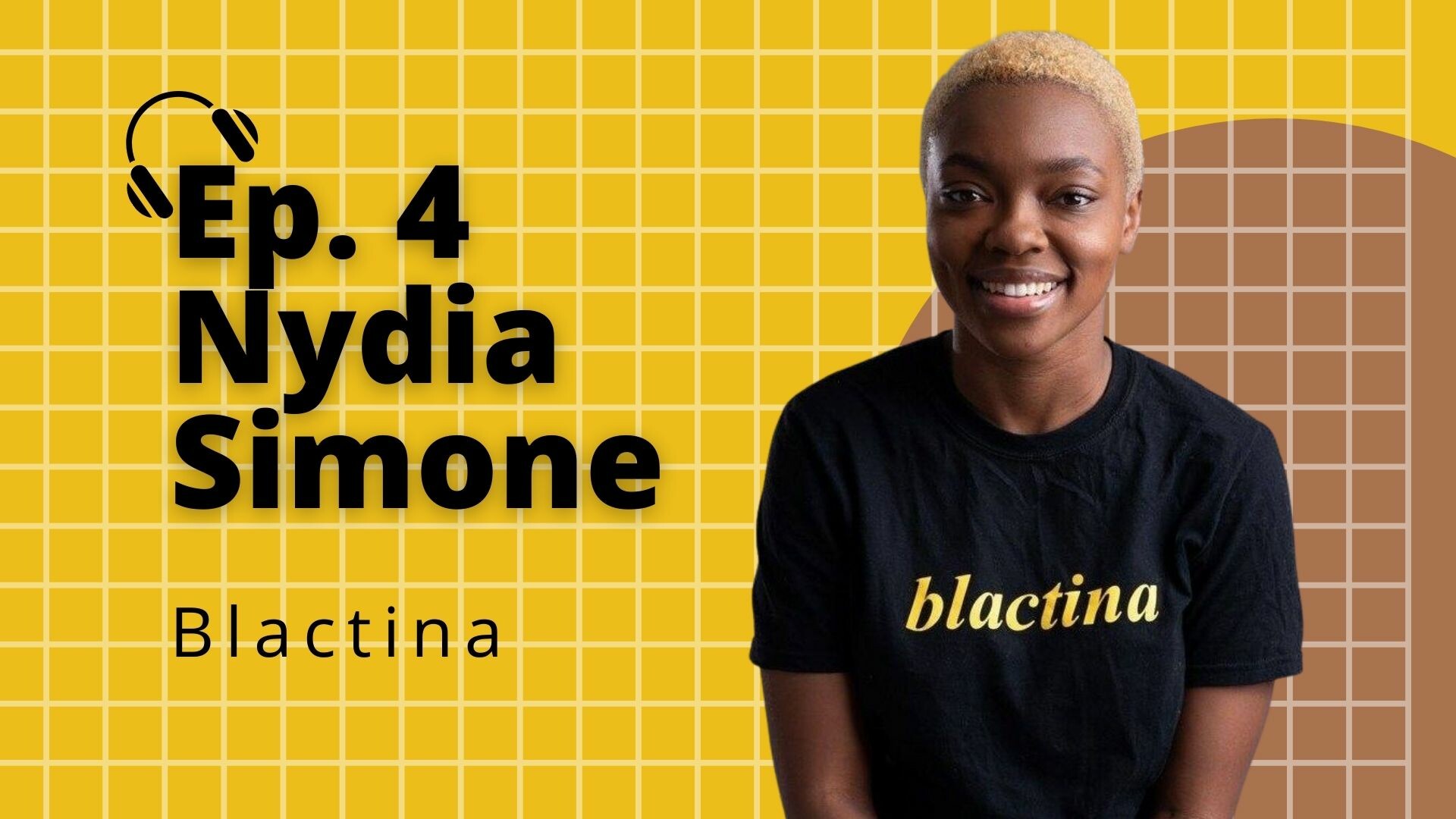
So let's get into it. I would love to hear more about your origin story with Blactina, Blactina Media.
Nydia Simone: There was this movie called Black and Cuba that I saw at the Pan-African Film Festival in LA. And that is like one of my favorite film festivals, super, super Black. It feels like a family reunion When you go and there's love and there's art and there's connection and there's support. There's all of that stuff. So I saw this film and it was about an NYU professor. I think she took her students to Cuba for research, and it was really nice to see them interact with Cubans, talk about racism, talk about Blackness in Cuba. And I saw my family. That's literally the Blackness that I come from also. My mom is African-American. My father is Panamanian. It's nice to see them interact and see that connectedness because at the end of the day, we Black, period. It was really nice to see that because a lot of times in the United States, African-Americans who are not familiar with Blackness in Latin America it will be like, "You're not Black, you're exotic.” Dude, slavery happened in places outside of the US. That was really nice to see that film. And I think because of that, I think I started to chill out and not feel like I have to create more Latinidad to be seen as more of... So I was like, "If they don't see me as Latin, that's fine,” because I have a whole community that is supportive, that loves me, like we're here, period. I don't have to pretend to be something else. I can be Nydia. Nydia is Afro-Latina enough. My African-American-ness doesn't invalidate my Afro-Latinidad or invalidate me as a Panamanian-American. I no longer say I'm Panamanian without context, because moving to the Dominican Republic has shown me that is erasure, because in Panama, they're not living the same lives. They're not having the same opportunities, which is why my family did migrate to the United States for me to have the opportunities that I do have.
That movie, I think it created a mindset that Blactina could exist. So even though I wasn't like, "I'm going to create Blactina with that." I knew that this is possible. If I can feel this way, there are people who are going to feel seen by seeing Black Latinos and my type of Blackness that I grew up in. So I was at a party at one of my aunt's parties and I asked one of uncles, Uncle Guillermo, "Would you watch a show about a Black Latino family? Just like on the fact that it's a Black Latino family." He was like, "Of course. Even if I hated it, I would still turn it on." So I was like, "This is the thing. I have to explore this. I'm going to get into this." And I started playing with ideas and Blactina was a play that I wrote.
And I loved the name Blactina. I made it up when I was in college and I felt connected to that word. I was like, "Okay, I'm going to write a web series called Blactina. And it's going to be like Living Single meet Sex In The City." And when I spoke to the Hollywood people, they were like, "Nobody's really going to distribute this because this is just too different. You're talking about some stuff that they don't even..." And this is like what... it's 2017? So it's like, "Their CPS is not going to green light no thing about Black Latinos and I'm freaking Panamanian, so I had that Caribbean thing with the... So it's like, they are not going to get it. They're not going to understand Black people who struggle with English, have an immigration story. Yeah. They're not going to get that.
So I was like, "You know what? That's okay because I've produced a web series. I feel confident that I can do this on my own." And then they're like, "If you can do this on your own, do it on your own first." Wrote up the web series and everything. Got this cool job at CBS so I was able to pay my bills. I moved to New York. So I saw my family, started having more money, started realizing I had to deal with all of this trauma because now I actually have the capacity. So it's like, "I'm sick." It wasn't even like, "Oh my God, I have all this money, my life is great". It's like, "Okay, I can finally pay these bills. I'm not happy and I have extreme anxiety, that's debilitating." I was like, "This sucks. And I don't get paid enough to afford therapy."
[music]
Yura Sapi: Chapter 10: Self-Care Equals Self-Love.
Around the same time I needed to leave my full-time administrator job in the US American Theatre back in 2018, I had to make an important shift in the way I show myself love. I had to learn to stop forcing myself, making excuses for why I was putting myself through a job, but also abusive relationships in that environment, physically unhealthy for my body and financially trapped. Doris Quintanilla, founder of The Melanin Collective. shared in this People Of Color Entrepreneurial Bootcamp about self-care for entrepreneurs, especially those of color. And that was when I first was introduced to this process of looking at my care for myself, my love for myself, looking at specific areas. Then during my artEquity Facilitator Training—artEquity is founded by the incredible Carmen Morgan—we were able to get more into this discussion about self-care and self-love. And then I started sharing my personal practice in a workshop with Minka Brooklyn in January of 2019. My practice now is to look at eight areas of how I'm taking care of myself, of how I'm loving myself. And every month I set new goals, check-in, set intentions and manifestations. I look at physical, mental, sexual, home life, work life, emotional relationships, spiritual, and financial self-love. It's been an essential practice for me these past years. It's about getting myself in alignment and right relation with myself, with others and the earth. It's about investing in ourselves as the project so that we can help others and accomplish our goals. I know I do better helping others when I'm receiving wellness myself. Healing is an essential practice that has to be present for all of us and self-care for me is about listening to our needs as human beings. It's about stopping the emotional and physical violence we're inflicting on ourselves. It's about protecting others from my lashing out, because I haven't cared for myself in other ways. And it's about taking control of our future, especially for those who are marginalized, oppressed, racialized. In this world where the systems and people in power benefit off of us not taking care of ourselves, doing so is a revolutionary act.
[music fades out]
Nydia: I got so tied up in this idea that this can be so much bigger and more money and dah, dah, dah. At that point I was listening to a lot of what other people were saying. And I've learned since then, ignore them, especially when it comes to your— When you're creating something new and different, you cannot listen to people who are not doing new and different things. You have to only listen to like the crazy people who are out there. And you're like, "How do you make a living?" And they're like, "I just like, I'm just a source of spirit in people. And this is what happens…” Like those are the people I need to get advice from.
[music]
I had a financier, he didn't get it. Like the company didn't get it. They didn't get: how are Black people not able to speak good English? How is it this idea—about Black business, very different to Afro-Latino. This idea of business—everybody has a business in the Latino community. Everybody does this. This is normal. Even if it's like small, whereas on the African-American side it's like, "Get a job. Get a high paying job and status." Which I'm not saying those things aren't a big deal in Afro-Latino community, but I was just so used to seeing more people making businesses on my Panamanian side. Also like a susu. There's different names for it in Latin America, in Africa, in Asia, you'll pay like $200 a month and every month a new person will get a pass. You'll have a certain amount of people for like the year. So it's a great way to save... That idea of trying things... I was trying to tell the company the way we see things is different, the way we see ourselves even, very different, the way we relate to government, very different. We do not expect government to help us. In Latin America a lot of the work is decentralized. So you weren’t gonna get—the government ain’t giving you no money. They’ll take some money! They gonna take money. They’re not going to give it to us. So I feel like that is in me too. And I was leaning more towards that. They weren't getting where shit was going. But I was like, "You're not getting it, but you're going to see it."
[music]
Yura Sapi: Chapter 11: Authenticity. Staying true to your audience.
Nydia: These were people who were BIPOC, who were not outside of the white supremacist world. And they were still in that Hollywood box. And this is no shade to them. They're amazing people, all of them. But I really felt like they were not getting it. And then they were getting it and they were like, "We get it, but the white people were not going to do it." I was like, "Well, this isn’t… Why do you keep on talking about white people?" Are there.... Why are we...? Is there a white person in the room here? So... And you know what? A lot of white people are into Blactina, they're into it. That was like a struggle. It was like, "Stop trying to like make my shit smaller. Like these things need to be in here for it. They're in there for a reason."
Long story short, I had to walk away from that deal. At this point, I have a community, even if it' seems small, because we had like 700 followers when the Oprah thing happened. I'll never forget because I was like, "700 followers and Oprah? We could do anything." I thought, I really thought I was going to be rich. I thought everybody's going to start calling me. I didn't become rich. But I was like, "Where's my riches?" I knew I had a community and I knew I had a responsibility to this community. They didn't understand the gravity of the loyalty I had already amassed because like the fact that just like people like… the fact that you're making a TV show about Afro-Latinas. That the fact that you were doing this, in this way, about Afro-Latinas… because at the time I didn't see a lot going on.
There were two big people in this space: Es Mi Cultura, which is a newsletter that showcases Afro-Latinas. And then it was Ain't I Latina? Ain't I Latina? I was literally like, "Okay, I hope sis is not mad because my business is very similar to Ain't I Latina? So, but I was like, "I got to do it differently because I'm not trying to like bite. I'm not trying to seem like I'm a biter." So I was like, "I'm going to do it my own way. I'm going to like do a different thing." So I did that, but also Janel was like super, super supportive. So it was never like, "You can't do this because I'm doing it." So then I decided to walk away from it because I started to have problems. Like I started having like physical issues and I remember one time we had like a writer's meeting and I had to go take a break to cry in the bathroom. I was having physical problems. It started to affect my body. I was also speaking up for myself. So I was being my own advocate and saying how I felt and I was being shut down and I was being told, "You're being difficult. You should basically be happy that somebody would take your little story." But I was like, "I'm Blactina girl. Do you realize, like I have people… like do you know who I am?" So so... But now people are catching up. More people outside of the community because the community always had my back. Now people outside the community are catching up to who I am.
I was just like, "Okay, they're telling me I'm being difficult. But like I'm literally having problems." And it got to the point where I cut my hair off. Like I'm too stressed to do my hair. Like I couldn't do my hair because the depression, it was this like anxiety, which is crazy that... I was like, "I can't do this. I have to cut it off." Because I'm like, "How do I wash it?" I don't want to wash it. I don't want to do it. And I'm not spending that money to get it—when you have natural hair, they want to charge you fricking all this money on the thickness of your hair, which is like, "You're going to use water anyway, girl." So I ended up cutting the hair, looking like a fricking star. Probably should have been a sign that I was on my way out. They were like, "Why did you cut your hair? You can just cut your hair like that." And it's just like "Y'all have not even paid me anything."
I ended up walking away from it. People were definitely upset because they wanted my audience. They did not want the actual authenticity. They just wanted the people to show up. The reason they're showing up for me is because I'm telling them stories. You cannot have it inauthentic and have the community support. It's not going to work. I had to walk away from that. And I was like, "You know what? I'm just going to go hard and make Blactina huge, so I don't even have to deal with people trying to undermine me." And now I'm on Telemundo. Now I got people calling me and it's only going to get bigger and bigger. And I'm really working on having a very strong hold in Latin America and in the Caribbean, and not just the U.S. because the U.S. will come.
I'm American. All I have to do is to leave. And they'll be like, "Ah, but you're American." Langston Hughes left, went to freaking Paris, became a star. They're like, "But you guys are American. Shouldn’t you be here?" Well, I was there first and y'all was trying to kill me. So I'm not worried about being whatever in the United States. I'm worried about having more of a foundation in Latin America and the Caribbean and wanting to have these Black spaces, safe spaces in Latin America and the Caribbean. And it's a shame that we even have to say that in the Caribbean, that we need Black spaces in the Caribbean that are safe.
[music]
Yura Sapi: Chapter 12: Saying No. Ignore That Box.
I love what you said about dodging these people and partnerships that don't serve you and your mission. Saying no to things that you don't want and that you're not aligned with so that the things that you are aligned with become available. Yeah. And then you can say, "Yes." It reflects as an individual, but then that also reflects into the company and into the organization.
Nydia: The late Chadwick Boseman talked about the work that he was getting and how he kept on saying, "No." He would be working with these amazing people. He's like, "I want to work with that person, I do, but not this way. I don't want to be like a thug. I don't want to be this character." When Black Panther came, he was completely available. He was ready for that. That for me was like super powerful. I have noticed that a little in my life too. And now I'm on a different place where I'm realizing like I can create anything. If I want something, I can create it. Like I have everything I need to do what I need to do.
The cool thing about where I am is this stuff that I'm getting right now, it's stuff that I want to do. So I don't have to be like, "Oh, I have to do this." And I think that's why I don't care what these other people are doing, because if you start putting yourself in a box, you're going to be trapped in that box. And then you're going to be like, "Why don't they hire me to do..." Because you, in your mind have already set the parameters for this box that white supremacy is putting you in. Ignore that box. Just say, "This is what I want to do."
[music]
Yura Sapi: Chapter 13: Centering Blackness and De-Centering Whiteness.
Nydia: I don't know how to explain it now because in 2019, I was like, "You guys, I'm ignoring white people all year.” Don't tell me about some racist stuff that a white person did. I don't care. I experienced it. Trust me there's enough racist stuff that I have experienced, that I will deal with. You don't have to show me any extra racist stuff that white people are doing because I got it. I get it. I know what's happening. I'm ignoring them. I'm surrounding myself with Blackness. We have to stay focused on Blackness long enough to fix these problems, because every time I turn around Black people are only talking about white people. And it's like, "If we could talk about ourselves for just a week to solve some issues in our community, but y'all are too wrapped up in whiteness. And why are you surprised? You know who these people are. You think the descendants of our slave owners, aren't going to suddenly turn around and want to help and change things. No, we have to solve our own problems.” Yes, they created it. Yes, they created the situation where we were taken from our homes and everything. But at this point I will say we have enough freedom, we have enough agency to actually make changes. And those of us who can do one thing, we need to do that. The way I moved to DR. I had the privilege. Well I left with $200. So I'm not even telling you to do what I did because I did— I left on a hope and a prayer. I was like, "You guys don't realize I have to leave because like, I can't afford to live here no more. Y’all don't realize like I need to go because I don't know where all this money is going to come for rent. I don't know you guys, I don't know. I need to take a break.” So I literally at $200 in the bank when I was on a plane to come to DR. It's really easier to make a foundation in a country where your rent is like 300 bucks a month for a one bedroom. It's a lot easier.
Yura Sapi: Yeah. I know. That's what I'm doing.
Nydia: Right. So now I have like a freaking two bedroom, two bath situation, and I'm still not paying the same amount of rent I was paying for a month in Brooklyn at the outskirts of Brooklyn.
[music]
Yura Sapi: Chapter 14: Secure the Bag and Get Paid What You're Worth.
The Blactina art dealing story. Tell us more about that.
Nydia: I have been wanting to buy art for like a month, original art, like not print stuff. I wanted a real piece of art in my home and I was looking online for people in the States and everybody... All the ones that I wanted, because I wanted Afro-centric art—this stuff was like all prints. And I was like, "I don't want a print in my house. Like there's no print. I want real stuff, where I can touch it. And I can feel the texture." I was just walking down the street one day and everybody's assumes I'm Dominican and that I don't got no money. [laughter] So I was looking at this. I was like, "Oh, this is nice." I was just walking. I saw this art, and I was like, "This is beautiful." And then I asked the guy like, "Oh, ¿Cuanto cuesta? How much it is,” and he was like, "Es muy caro.” He was already like, "Girl, you probably can't afford this anyway."
So there's another place that came up and it was like more inside. I was like, "I going to look at this art. Whatever." I saw my night guard. We did our little thing, like, “How are you? How are you? Okay. Let me see what you got, let me see what you got here." And then I found a piece that I really liked that he gave me an amazing deal. I would never have gotten that piece in the States. Impossible! And I was like, "Oh my God, this is amazing." It was the first piece I've ever bought of art, like original art and I was just really excited. So of course I share with my audience and I was like, "You guys, this just means so much. I feel like my maternal ancestors are watching me with this piece and they're here and it just really made my house a home."
And they were like, "Where'd you get that?" And I told him, I was like, "There's this guy." I was like, "Let me know if you want something and I'll ship it to you wherever." People started like sending me Cash Apps, sending me stuff. And it like, kind of became like a thing. It was fun. And I was like, "I feel so alive. I feel like doing things." And then we got a celeb because like Sheryl Lee Ralph follows me. So she bought mad art. So that was amazing. And it was just like nice to feel like, "Wow, I'm being so useful because I can connect with the artists, with people who can never connect with these people. Half of them don’t event have phone numbers. It was like, "Whoa, I'm doing something that fricking matters right now. Everybody's so excited about, and I'm happy about it too. I'm having fun." I was having so much fun.
Yura Sapi: It seems like it was investments from the past, the investment in the community that you have online and these seeds that were planted in the past are now ready to fruit.
Nydia: Literally like planting. And there were times when I just really felt like no—, like the community cared, but I was like, "But I'm not getting paid for this. This is exhausting. This is work. And where is the fricking return? Like I have bills to pay." That time was the building. I was building this foundation. So now I have a foundation where people will just send me money straight to my bank account.
Yura Sapi: Well you've built that trust. Yeah, exactly.
Nydia: The thing about Blactina is I'm a great storyteller and that's why people come, because they want to be a part of the story and feel like they're living through me. So I give them that experience. Like when I'm talking about Haitian art and the materials that they use to do this... Because they're not using canvas. This is fabric. They're using wood to make the frame. This is sustainable art. And this is a certain type of art that you're going to find a lot in Haiti. It's very Haitian. It's interesting, because I like the Dominican art nobody wanted to buy it. And I noticed a lot of the art that I saw by Dominican artists wasn't Afro-centric. It was like a white person or like someone who could be a white person based on like the certain features they had. Or it would be of things like trees, a fish, abstract. I was like, "That's interesting. I wonder if I can find some Dominican art that is Afro-centric?" Because my audience only responds well, even if they're white, they want Afrocentric art. That's why they come to Blactina. And that's why I created it. Because I'm like, "I'm Mrs. Black." So like, "If you coming for Black stuff, come on down, we got it." Well we got it Afro-Latino and Caribbean because those stories tend to be erased. So that's where I kind of like live for now, por ahora.
Yura Sapi: Love it.
[music]
I'd love to ask if there's some final advice you'd like to give to anybody who might be thinking about starting an organization, a collective, an initiative, a movement. Maybe also thinking about the social media component too, because you're such an expert.
Nydia: I will start with how are you going to make money? Because you are not going to be a good vessel if you are struggling and you're hungry and your housing insecure. So I'm like, "You need to think about how can you pay your bills first and also be creative!" Be creative about how you can pay these bills. Because a lot of organizers are extremely skilled and I'm like, "Y'all are leaving money on the table. And I don't know why?" You can apply for grants, but you can also charge things and you have to be more realistic.
I have organizer friends and they just be in this cloud and white people are not going to willingly give you... Freedom is never given. They're not going to give you anything. You have to take your freedom. Currency. I think people, they want to be anti-capitalist and I'm like, "You can't be anti-capitalist in a capitalistic world. How are you going to eat? You need to feed yourself." That is something that I've dealt with for a long time. Battling homelessness, battling food insecurity. I have so much better ideas now. I can think. You need to think. So we got to stop at that mentality and you have to learn how to receive abundance. Learn how to take money, learn how to receive a gift because the hardest thing for me was, I was getting anxiety when I started getting more money. When my bills started getting paid, I was like, "Wait, is the money going to stop?" I was used to a situation where "Okay, the money's going to run out and then I'm going to need to like hustle… Because like, wait, I don't have to be in this constant state of hustle mode and that made me anxious. "Is there something else going to come?" So I think we got to learn how to have abundance, how to receive abundance. That's the work too is actually receiving money and getting paid for your work. And you need to get paid for your work because your work is valuable. Stop undervaluing the work that you're doing.
[music]
Yura Sapi: What's next for Blactina? What's next for you?
Nydia: What's next with Blactina is like, now that I know that I can create anything I want, I'm going to be more creative about funding. Because that's been really hard is to finance these films. And that's why I've been doing other things because the film funding was just not where it needed to be. So now with the art bag, I can use some of that art bag to put into films and be creative that way. Still fundraising to produce these film, having a healing retreat, it's going to be in the Dominican Republic and just like follow Blactina on IG and watch the journey and like buy some art when it's available.
Oh, and I'm writing a book, which obviously like... I'm like literally every medium and art, like visual art, film, digital media, and now I'm writing a book about all the things that I... It's like literally the same thing about what I'm doing and just having it in book form.
Because I like to talk about freedom fighters on the IG a lot. And I want to have a place, a book where all of Latin America, these are freedom fighters that you need to know. These are special things about our history that you need to know because it's so hard to find that history, especially in English. The Americans have so much privilege and I'm trying to tell them, "You guys got to go back.” You guys got to go back because you're going to be happier. Because you're going to be able to do—just navigate way better. And then you're going to be able to help the community. And the community needs to see your face be successful. They need to see that. That's a face of success too, because they're not seeing that face.
[music]
Yura Sapi: Thank you. Thank you so much for joining me today and on this podcast, talking about planting seeds, about your origin story, about dreaming big and being a visionary, about everyone having a role in the revolution too. I think you talked a lot about being a connector and I see that as an important role you're playing. So yeah, thank you for being on the podcast and thanks for all the work that you're doing.
Nydia: Thank you. This was great. This is awesome. Follow Blactina, everybody, on IG. Follow Blactina Beauty on IG.
[music]
Yura Sapi: This has been another episode of The Building Our Own Tables Podcast. I'm your host, editor and producer Yura Sapi. Original music by Julian Vargas. You can find and follow them on SoundCloud. This podcast is produced as a contribution to HowlRound Theatre Commons. If you love this podcast, donate to support future episodes at advancingartsforward.org. You can find more episodes of the series than other HowlRound podcasts in our feed on iTunes, Google podcasts, Spotify, and wherever you find podcasts. Be sure to search HowlRound Theatre Commons Podcasts, and subscribe to receive new episodes. There's a transcript for this episode, along with a lot of other progressive and disruptive content available on howlround.com. Have an idea for an exciting podcast, essay, or TV event the theatre community needs to hear, visit howlround.com and submit your ideas to the commons.
Thanks everyone. Yupaychani. Check in with you next time. Adiós.
[music fades out]

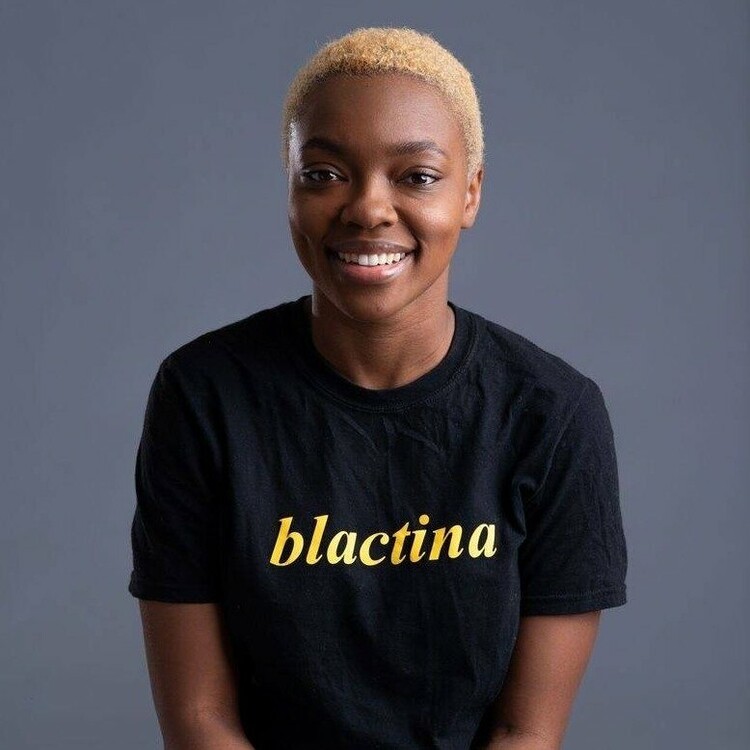
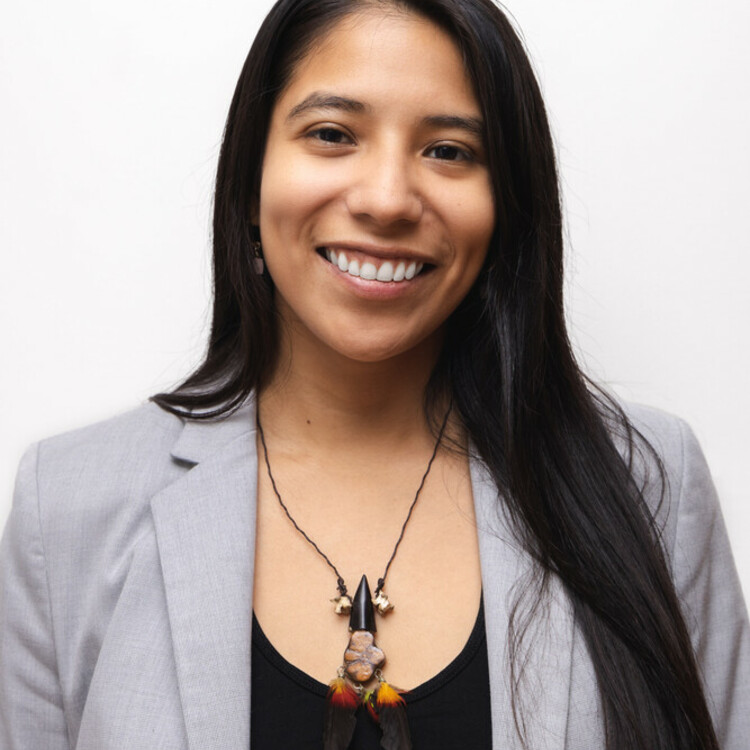
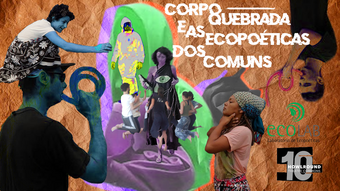

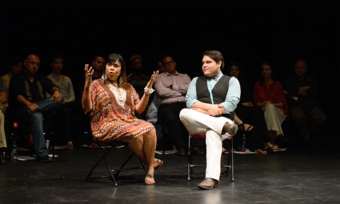


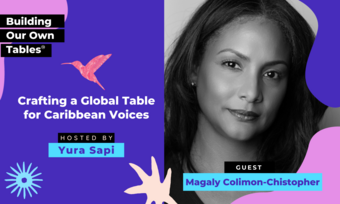


Comments
The article is just the start of the conversation—we want to know what you think about this subject, too! HowlRound is a space for knowledge-sharing, and we welcome spirited, thoughtful, and on-topic dialogue. Find our full comments policy here